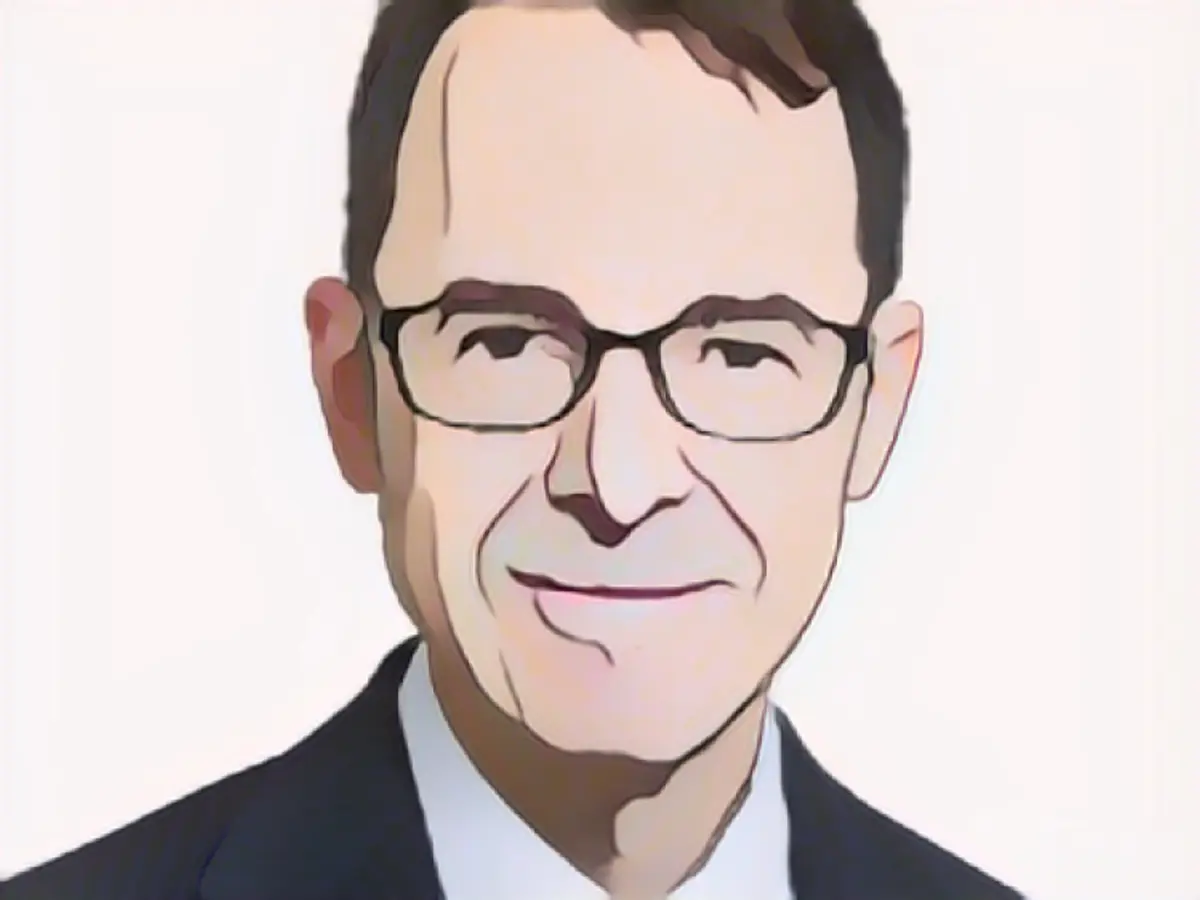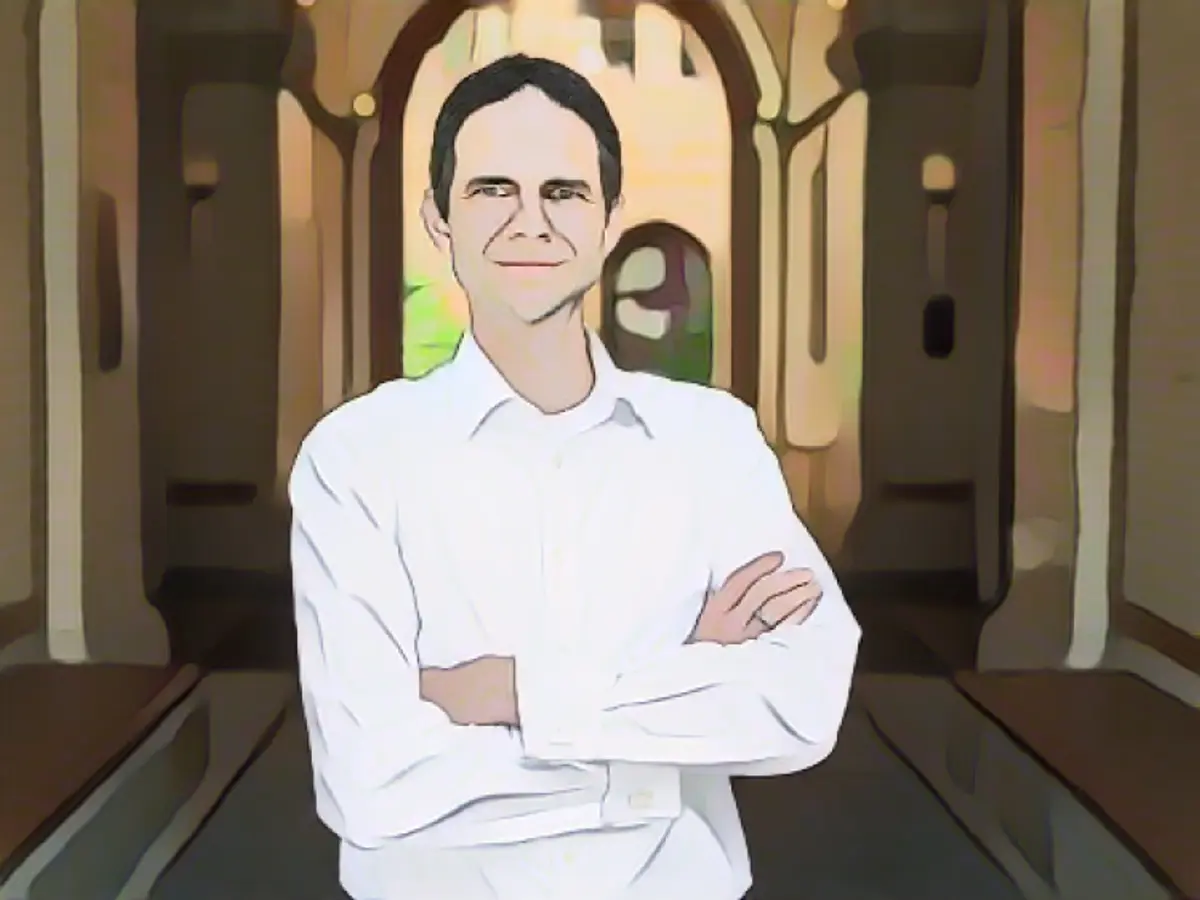Will the rally continue or will there be a major correction?
The stock markets in Germany and the USA have risen sharply this year. Falling inflation rates in particular provided support. ntv.de discussed with four financial market experts whether the bull market will continue in 2024.
ntv.de: The DAX and the US S&P 500 have made considerable gains this year. Historically, the stock markets actually need two years to achieve such a gain. Aren't the stock markets ready for a downward correction?

Reinhard Pfingsten: The strong price rises so far should be seen as a counter-reaction to the poor stock market year 2022. In the short term, a correction is certainly possible after the run, especially as economic and earnings growth in the fourth quarter is likely to have been rather weak. But overall, the positive trend should continue.
Marco Herrmann: Periods of consolidation are part of the nature of the stock markets. One or two months of higher inflation rates could dash hopes of rapid interest rate cuts and usher in such a phase. This should not jeopardize the medium-term upward trend.
Michael Wittek: Buzzwords such as the war in Ukraine, the conflict in the Middle East and concerns about the economy have caused the markets to climb the "wall of worry". There will be corrections. Because they are completely normal on the stock market.
Oliver Zastrow: There is certainly potential for a correction and volatility remains quite high. Prices are strongly driven by data. The tension between inflation and interest rate expectations remains. In addition, the market is already technically significantly overbought in some areas. However, the momentum remains positive.
ntv.de: The main price driver was the expectation of investors that the central banks, i.e. the US Fed and the ECB, would not raise their key interest rates any further but would soon start to cut rates. Isn't that a little premature?
Zastrow: Investors are certainly hoping that the US will aim to make its first interest rate cuts by the middle of the year and that the ECB will follow with a slight delay.

Herrmann: In our view, the current expectation of up to five interest rate cuts is a little too optimistic. We expect only two rate cuts from the ECB and three from the Fed.
Pentecost: As a rule, central banks do not wait for the two percent inflation target to be reached before making their first rate cuts. That's probably the case this time too.
Wittek: In my opinion, the main price driver was the higher valuation of shares and the pricing out of a recession.
ntv.de: In Germany, unions and employers' associations agreed in some cases on double-digit percentage wage increases. In the USA, wages in the automotive industry are rising by as much as 25 percent. Isn't there a risk of a wage-price spiral and a renewed rise in inflation?

Wittek: I certainly see the danger. If the economy doesn't cool down and acts as a counterbalance: Yes, then inflation is likely to rise again.
Herrmann: I take a similar view, especially in the long term. Demographics are increasingly becoming a driver of inflation. A lack of workers has shifted the bargaining power in favor of the trade unions.
Pfingsten: I'm a little more relaxed about that. Even though some of the wage increases have been very significant and this means that employees have seen real wage increases for the first time in a long time, we do not see the danger of a wage-price spiral. However, the headwind from this side will lead to a slowdown in the continuing downward inflation trend in 2024.

Zastrow: The US labor market is currently cooling down, so future agreements could be more moderate again. The trade unions, especially in Germany, are arguing that the high wage demands are compensation for past price increases. As inflation is falling here too, this argument is no longer valid for future rounds.
ntv.de: Oil has tended to dampen rather than drive inflation this year. Could it work the other way in 2024?
Herrmann: For energy prices to rise more strongly again, either global growth would have to gain momentum or the situation in the Middle East would have to escalate. I don't see either happening at the moment.
Pfingsten: In our opinion, the development of the oil price depends on two factors. Firstly, how strongly the global economy develops and secondly, how disciplined the OPEC+ countries are in implementing their production volume agreements. Both are difficult to predict and can lead to swings in either direction. However, an increase in geopolitical conflicts, particularly in the Middle East, could lead to a rise in oil prices.
Zastrow: That is certainly the case in the short term. But a price of around 80 dollars per barrel (159 liters) currently seems to be in line with OPEC+. The accelerated energy transformation towards renewable energies and nuclear power argues structurally against a significant increase in the longer term.
Wittek: Below 60 dollars, the USA would replenish its strategic reserve and thus ensure demand. Above 100 dollars, it becomes very attractive to increase supply and this would slow down the price increase. Therefore, the impact on inflation will not be too great.
ntv.de: How great are the recession risks in the USA and Europe and are they priced into the stock markets in any way?
Pfingsten: We expect the US to repeat its coup in 2024 and avoid a recession by a wide margin. Contrary to widespread expectations, we do not expect growth in the world's largest economy to slow down significantly, but rather to consolidate at more than two percent. As our global growth picture is above market expectations, we still see positive potential for surprises on the stock markets.
Herrmann: I disagree with that. In the USA, the economy is still benefiting from high fiscal stimuli, but the leading indicators are already pointing to a noticeable slowdown. The Atlanta Fed's indicator currently shows growth of just 1.2 percent. Economic concerns are likely to remain with us for much of the first half of the year, as the braking effects of the previous interest rate hikes will continue to have an impact. However, we do not see a recession in the USA.
ntv.de: In the US, the so-called Magnificent 7, i.e. Alphabet, Amazon, Appel, Microsoft, Nvidia, Meta Platforms and Tesla, in particular have pulled Wall Street upwards. Are these also the favorites for 2024 or will there be a change?
Wittek: These stocks will also be in demand in 2024 because the companies generate high profits and high cash flows. They also have little to no debt. But we don't think they will achieve the same value increases as this year in 2024.
Zastrow: The generally high valuation is one of the few arguments against the big tech stocks. On the other hand, there are many positive aspects: the momentum, the pricing power, the high free cash flows, the relatively low debt ratio in comparison and the recent AI boom. However, tech companies also have to meet high expectations. But as is so often the case, if everyone is so sure, it could also be a counter-indicator.
Pfingsten: We don't expect investors to turn their backs on artificial intelligence. And as long as the companies they are talking about do not disappoint on the earnings side, share prices will continue to rise. However, the price increases will be lower than in 2023.
ntv.de: It's not particularly sustainable if only a few very few companies cause the stock market to rise while the wider market moves sideways.
Pfingsten: That's absolutely right. Moreover, this valuation gap exists not only between the US tech giants and the broad US market, but also between different regions. The European stock market, for example, is valued much more attractively than its US counterpart. Experience shows that these trends reverse over time. However, it is impossible to predict when this trend reversal will start.
Wittek: But that doesn't necessarily mean that the Mag 7 will have to correct. The other stocks can catch up by rising while the Mag 7 moves sideways.
ntv.de: How could corporate profits in the USA and Europe develop in the coming year?
Zastrow: Cautiously optimistic, profits could rise moderately with a soft landing. In the USA, this could be somewhat more pronounced than in Europe, where structural problems need to be solved.
Herrmann: We are more positive about companies' earnings prospects than we were a year ago. This is because cost pressure is easing somewhat, energy and transportation costs are falling again, demand should pick up again from a low level and consumers are doing better than feared. The technology sector is also benefiting from investments in the digitalization of the economy.
Wittek: We are less confident and expect only stable to slightly rising company results.
ntv.de: What range should the S&P 500 and the DAX be in over the coming year?
Herrmann: An attractive valuation, rising corporate profits and the probable turnaround in monetary policy open up further price potential for equities in 2024. After a possible temporary correction in the first quarter, the DAX could rise to 17,500 points in the course of the year. We consider 5,000 points to be realistic for the S&P.
Whitsun: In principle, we expect index levels to rise, but this does not mean that the indices could fall below their current levels from time to time. For the S&P 500 index, we consider a rise to 4800 points to be realistic, while we could imagine the DAX exceeding the 18,000-point mark.
ntv.de: What are the stock favorites for 2024, which regions, sectors or individual stocks are promising?
Wittek: We are focusing on a mix of Mag 7 and dividend stocks with a focus on Europe and the USA.
Zastrow: Yes, exactly. The USA and Europe should be weighted higher as a core investment. Here, stocks with good balance sheet quality and low debt as well as quality stocks with high dividend continuity are particularly promising, as are companies with disruptive technologies, especially in the areas of AI and cybersecurity.
Pfingsten: We are positioning ourselves slightly differently. From a regional perspective, we are starting the year with an overweight in the Japanese and European equity markets. Due to the high valuation level and the significant profit increases in the United States already included in the forecasts, we recommend underweighting the US equity market.
Herrmann: In an environment of low economic growth, defensive quality stocks usually perform best. In addition to the healthcare sector, which disappointed in 2023, and producers of everyday consumer goods, high-growth technology stocks should also come out on top again in the new year. We focus primarily on the qualities and business prospects of individual companies and less on regional allocation.
This publication is for information purposes only and for use by the recipient. It constitutes neither an offer nor a solicitation by or on behalf of Albrecht, Kitta & Co. Vermögensverwaltung GmbH, Deutsche Apotheker- und Ärztebank, FIDUKA Depotverwaltung GmbH and Qcoon GmbH to buy or sell securities or investment funds. The information contained in this publication has been compiled from sources believed to be reliable. However, Albrecht, Kitta & Co. Vermögensverwaltung GmbH, Deutsche Apotheker- und Ärztebank, FIDUKA Depotverwaltung GmbH and Qcoon GmbH make no representation as to its reliability or completeness and disclaim any liability for losses arising from the use of this information.
Read also:
- This will change in December
- Attacks on ships in the Red Sea: shipping companies avoid important trade route
- Houthi rebels want to launch further attacks despite international coalition
- USA forms military coalition against Houthi attacks on ships in the Red Sea
- Reinhard Pfingsten, the Chief Investment Officer at Deutsche Apotheker- und Ärztebank, believes that the strong price rises in the stock market should be viewed as a counter-reaction to the poor performance in 2022.
- According to Marco Herrmann, Managing Director at FIDUKA Depotverwaltung, periods of consolidation are normal in the stock market and a phase of higher inflation rates could bring about such a period, but it should not jeopardize the medium-term upward trend.
- Michael Wittek, Head of Portfolio Management at Albrecht, Kitta & Co., thinks that the markets are currently climbing the "wall of worry" and there will be corrections, but they are completely normal on the stock market.
- Oliver Zastrow, Managing Director at the Qcoon Group, believes that there is potential for a correction and volatility remains high, but the momentum remains positive.
- The experts agree that the main price driver for the stock market was the expectation that central banks, such as the US Fed and ECB, would not raise their key interest rates further but would soon start to cut rates.
- Regarding potential wage increases in Germany and the USA, Michael Wittek sees the danger of inflation rising again if the economy does not cool down and act as a counterbalance.
- To address the issue of high valuation of shares and the pricing out of a recession, some experts suggest focusing on dividend stocks with a focus on Europe and the USA.
- In light of the recession risks in the USA and Europe, Reinhard Pfingsten believes that the US will avoid a recession by a wide margin and the EU will have to solve structural problems. He also mentions that there is positive potential for surprises on the stock markets due to global growth being above market expectations.
Source: www.ntv.de







